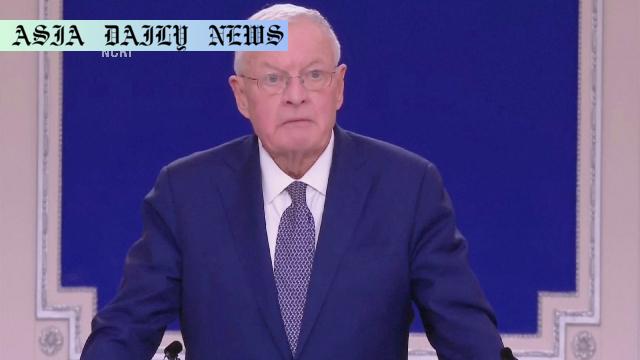Ukraine is urged to hold elections during wartime, fulfilling democratic norms despite the Russian conflict.
- US special envoy Keith Kellogg suggests Ukraine hold elections post a ceasefire agreement with Russia.
- Such elections are seen as critical to restoring democratic processes despite martial law.
- Putin casts doubt on Zelenskyy’s legitimacy, citing election postponement.

Introduction: Ukraine’s Crossroad Between War and Democracy
The ongoing war between Ukraine and Russia has plunged the region into turmoil, leaving a trail of destruction and uncertainty. Yet, amidst this challenging backdrop, there emerges a unique call for democratic engagement. Keith Kellogg, the US President Donald Trump’s special envoy for Ukraine and Russia, has suggested the need for Ukraine to hold presidential and parliamentary elections, even during wartime. This proposition, aimed at fostering legitimacy and returning democratic processes, raises multiple questions about feasibility, timing, and global implications.
Why Elections Now? Kellogg’s Perspective
Keith Kellogg, in an interview with Reuters, underscored the importance of elections even amidst war. He noted, “Most democratic nations have elections in their time of war. I think it is important they do so.” Kellogg’s statement points to historical precedents where war-torn nations have conducted democratic processes, aiming to preserve and strengthen internal governance structures. According to sources cited by Reuters, these discussions are being advanced within the US administration to drive an agreement for elections as part of an initial ceasefire with Russia. The underlying assumption is that the elected leadership would provide a strong mandate to negotiate a prolonged peace pact with Moscow.
The Current Impasse and Zelenskyy’s Challenges
Ukraine currently faces a unique impasse. With its wartime conditions legally enforced under martial law, democratic activities, including the 2024 presidential election, remain suspended. President Volodymyr Zelenskyy’s administration has justified the postponement based on the nation’s dire state, prioritizing national security over electoral processes. This reasoning, however, has invited criticism from certain quarters. Russian President Vladimir Putin has questioned Zelenskyy’s legitimacy, arguing that the absence of elections undermines his democratic accountability.
The Global Perspective on Wartime Elections
The call for elections in a nation grappling with war is not without precedent but remains rare. Kellogg’s assertion that many democratic nations conduct wartime elections touches upon an understood yet seldom utilized practice. Historically, leadership continuity through elections has empowered nations to establish stronger negotiation points in global diplomacy. However, critics—and likely Ukrainian policymakers—may fear that hastily arranged elections could be exploited for political leverage, both domestically and internationally.
Challenges to Implementation
While the idea may sound commendable, practical challenges abound. Firstly, parts of Ukraine remain under Russian control or are conflict zones, leaving millions of Ukrainians displaced. Organizing elections would mean ensuring all citizens can safely vote, which could seem logistically implausible given the short-term timeline. Moreover, there remain deeper concerns—holding an election amidst ongoing shelling could jeopardize not just infrastructure but also the lives of voters and poll officials.
Kellogg’s Vision vs Ground Reality
In speaking about Ukraine, Kellogg is encouraging a vision where the nation balances wartime measures with democratic values. While the logic appears sound, critics of Kellogg’s approach argue he may not fully grasp Ukraine’s immediate challenges. The question of how this election could strengthen Zelenskyy—or any successor’s—legitimacy poses debates. Furthermore, if Russia chooses to disparage the process or disrupt polling, it could undermine the effort for a ceasefire rather than support it.
Possible Consequences for Future Peace Talks
If Ukraine does conduct elections successfully, the outcome could be a game changer for its international image. It would demonstrate resilience and commitment to democracy under exceedingly challenging circumstances. However, the processes around the election could also become a tool of propaganda by external players, particularly Russia, aiming to frame Ukraine’s democracy as flawed or prematurely attempted.
Conclusion: A Gamble for Peace and Legitimacy
The suggestion posed by the Trump administration’s special envoy presents a gamble for Ukraine. On one side lies the opportunity to restore democratic normalcy and establish a robust negotiation platform for peace. On the other is the risk of logistical failures and further disruption. Time will reveal whether Ukraine can take this challenging yet potentially rewarding step towards electoral democracy amid another phase of its existential battle with Russia.



Commentary
Wartime Elections: A Controversial Proposition
Conducting elections during war is an undeniably bold proposition. While it showcases resilience and adherence to democratic principles, the complexities of such an undertaking cannot be overstated. Ukraine, already burdened with addressing hostilities and economic strain, faces grave logistical and moral challenges in accepting this recommendation.
The Balancing Act of Governance
From an observer’s perspective, the suggestion evokes mixed reactions. On the one hand, nations fighting for sovereignty should equally fight to preserve their democratic identity. On the other, the strain of organizing a legitimate and fair election process should not detract from urgent resources required for defense. This makes the timing and broader context of the proposal critical. Is Ukraine prepared for the risks this calls for? The answer remains to be seen.
Global Implications of Ukraine’s Decision
The potential global impact—on diplomatic relations, political trust, and international alliances—cannot be ignored. An election during these times could either embolden Ukraine’s position or inadvertently undermine its government credibility, especially if fraught with delays or controversies. This proposition needs strategic planning to avoid exacerbating internal divisions, an outcome Russia could exploit.
Final Thoughts
Wartime elections are a reminder of the strength required to uphold democracy even when survival is on the line. Is Ukraine ready to take this leap? This question does not merely concern Ukraine or Russia but resonates as an emblematic test for democracies worldwide. Ultimately, the success or failure of such elections will establish a precedent for balancing governance and resilience during conflict.